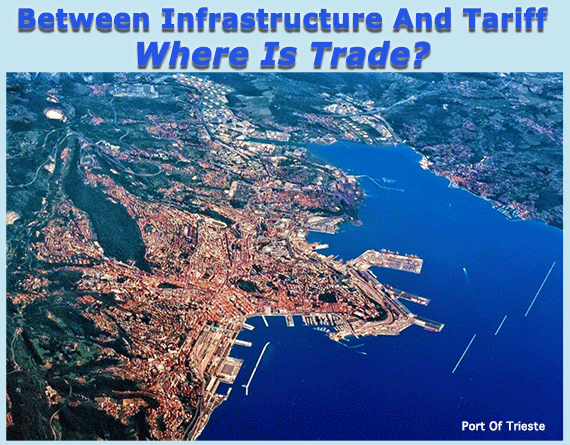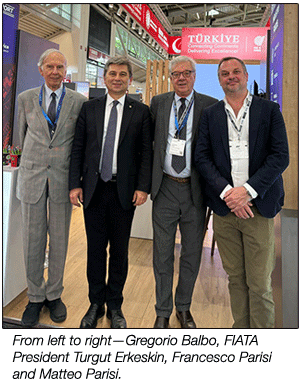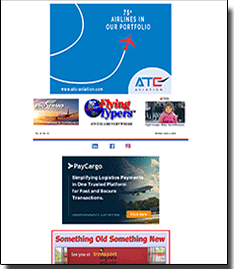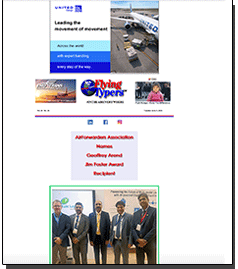 |
Those who were in Munich recently for Transport Logistic Munich know that international trade, which is the main engine behind global logistics, is thriving on one side, whilst running its greatest risks at the same time. Clearly some of those in the attendance were not comfortable with the ‘elephant in the room’, others simply ignored it. Fact is trade negotiations 2.0 have started and nobody really knows where they are heading. I remember a wonderful song written and performed by Bob Dylan called Señor. There was a precise question that was repeated several times in the refrain: “can you tell me where we’re heading?” If you get to the end of the song, while listening your uncertainty will increase and become an obsession. But if you do nothing the uncertainty will not diminish. This is one situation, you may sit there and ask yourself where you are heading, or else you may simply plod along and make the most of the situation, perhaps looking for alternatives. There is so much to do anyway and if you wish to look for alternatives, there are many available. So between the drama of the song and reality there is a way out apparently. So where is trade heading? Ostensibly the USA and China just struck a deal in London . . . and the rest of the world?
 In this period of great uncertainty there are many who are satisfied by working on their own piece, without distraction. If you take the example of trade finance, these guys know that whatever happens in future, trade finance needs to be there. In Italy these distinguished professionals are generally members of an association called Credimpex. Its President is Alfonso Santilli, (left) a person who devoted his entire life to trade finance, representing his association nationally and abroad. In this year’s report, which was read before the entire membership in the splendid Milan Museum of Science and Technology on May 23rd to celebrate the association’s 40th anniversary, we heard a number of interesting concepts regarding the state of international trade, as seen by Credimpex. If the words ‘letter of credit’ mean anything to you, well . . . that is the place to be in order to keep up to speed with the latest developments. In this period of great uncertainty there are many who are satisfied by working on their own piece, without distraction. If you take the example of trade finance, these guys know that whatever happens in future, trade finance needs to be there. In Italy these distinguished professionals are generally members of an association called Credimpex. Its President is Alfonso Santilli, (left) a person who devoted his entire life to trade finance, representing his association nationally and abroad. In this year’s report, which was read before the entire membership in the splendid Milan Museum of Science and Technology on May 23rd to celebrate the association’s 40th anniversary, we heard a number of interesting concepts regarding the state of international trade, as seen by Credimpex. If the words ‘letter of credit’ mean anything to you, well . . . that is the place to be in order to keep up to speed with the latest developments.
Alfonso Santilli stated: “In collaboration with the historic partnership ICC Italy, we maintain our commitment to the important process of incorporating the MLETR "Model Law on Electronic Transferable Rules" into our national legal system. The model law, prepared by UNCITRAL (United Nations Commission On International Trade Law) on July 13, 2017, can be used by countries to prepare their own internal (national) laws for the transfer of electronic credit titles. Once this "Model" is incorporated into the legislation of the different States, it will finally allow the discipline of transferability of credit titles to be standardized, thus including the Maritime Bill of Lading. We are following, very carefully, the work of the IV group of the United Nations Commission on International Trade Law (UNCITRAL) toward the development of a new convention on negotiable cargo documents. While maritime bills of lading are widely used as property titles or, better, representative titles of goods, transport documents issued by rail, road and air carriers (often known as "waybills") cannot perform this function. This new convention intends to create a new type of property document called ‘negotiable cargo document’, which could perform a function similar to that of a maritime bill of lading for the transport of goods for any mode of transport in a multimodal or unimodal context.” It was noted that China is particularly keen to develop such instruments, understandably so.
These are the pillars of international trade discussions at this point in time. How the traditional trade finance scheme will change into contemporary, paperless and digital transaction patterns, albeit without losing the commercial discretion of the document of title issued ‘to order’ will probably set the pace at which trade will flow in the near future. As we all know, Singapore, the UK and a bunch of other countries have made, or are about to make these instruments available to their trading communities. This discussion is not so important in the USA, as U.S. trade does not rely on these tools as much as the rest of the world, but it is extremely important in Asia and, similarly in Africa and Europe.
In the air cargo sector the letter of credit is not used so frequently, but when you talk of maritime transport this remains a principal instrument to sell your products abroad. Precisely on the same date (May 23rd) we heard the voice of FIATA with a very specific and thoughtful note on other concepts that are quintessential for international trade: “Airfreight: Transpacific Air Cargo Faces Turbulence Amid Regulatory Shifts. The transpacific air cargo sector is facing significant disruption and uncertainty following the suspension of the U.S. de minimis tariff exemption for low-value shipments from China. According to Reuters, this policy shift has resulted in a near 30% decline in airfreight capacity between China and the U.S. Major Asian carriers have been particularly affected, given their reliance on e-commerce shipments from fast-growing retailers. Although, there has been a temporary easing of tariffs following a recent improvement in U.S.–China trade relations, the longer-term outlook remains uncertain in the absence of restored duty-free access. The air cargo industry continues to navigate a volatile landscape shaped by economic headwinds and growing protectionism and freight operators are seeking alternative strategies.” Apparently some kind of deal was reached, as reported by the NYT, but we still need to see whether the announcement, responding to the need to proclaim progress, remains in keeping with the high hopes of the operators.
FT managed to speak with a fair share of those gathered in Munich and we were even invited for an aperitif organized by the Port of Trieste, our friend Francesco Parisi’s home town. We could not pass the opportunity to ask him a few questions. So here follows a short interview with Francesco Parisi, who was happy to discuss the situation of Transport and Infrastructure in Italy and in Germany in particular. Francesco observed that the Munich Messe is one of the great yearly events for logistics in the world – in a way impossible to miss. Francesco reflected on the infrastructure being in a dire situation both in Germany and in Italy, especially across the Alps. “Crossing the mountains has become a bigger problem today for Italian logistics than it was in the past.” Francesco quoted the example that ten years ago it took about five hours to drive from Munich to Trieste (his hometown) whereas today it is seven hours if you are lucky. One could argue, but this was not part or Francesco’s statements, that the only place in the world where infrastructure is treated in a systematic manner is actually the Asian continent, and even there, not everywhere! Parisi also mentioned the situation of the Tauern mountain chain railway in Austria, whose transit had been closed for months creating a number of problems; one wonders how is it possible to simply close a connection for months and expect people to adjust? Francesco however acknowledged the fact that the base tunnel at Brenner will be a significant relief in the years to come. A long way moving forward, but the base tunnel at 700 meters’ altitude will come as a priceless advantage in the alpine crossing, in particular in winter. This will be the longest tunnel in the world at this altitude. Not far from my home town, Turin, the alpine overpass of the Alps on the west side has not been ideal for months now, with several roadblocks and diversions. After five years’ closure the direct link to Nice in France seems to become available again by the end of this month, until when?
 Francesco Parisi also denounced the fact that both Germany and Austria live a prolonged recession, which affects the entire EU trade. There are some transport peaks, almost unforeseen, that are difficult to preview and this creates total uncertainty: a hard bite, difficult to handle for logistics and transport companies which hope to secure regular traffic. This situation is actually made even worse by the policy that the Trump administration has kicked in, in combination with a simultaneous recession in Germany. At the moment it is difficult to understand how, or even whether the German “locomotive” will be able to start all over again, because its industry is actually on a lame path and it is not easy to understand whether it will overcome these problems soon, or even if we have to adapt to a completely new reality looking at the largest country in the EU. After the new German Coalition Government was formed there are however signs of improvement and recently the political debate in Germany has overcome the historical problem of its constitutional limitation to adopt a balance deficit. Francesco said that there seem to be significant tax reliefs for German companies in order to re-ignite the engine of its economy. So it is expected that the situation could improve in future. Francesco Parisi also denounced the fact that both Germany and Austria live a prolonged recession, which affects the entire EU trade. There are some transport peaks, almost unforeseen, that are difficult to preview and this creates total uncertainty: a hard bite, difficult to handle for logistics and transport companies which hope to secure regular traffic. This situation is actually made even worse by the policy that the Trump administration has kicked in, in combination with a simultaneous recession in Germany. At the moment it is difficult to understand how, or even whether the German “locomotive” will be able to start all over again, because its industry is actually on a lame path and it is not easy to understand whether it will overcome these problems soon, or even if we have to adapt to a completely new reality looking at the largest country in the EU. After the new German Coalition Government was formed there are however signs of improvement and recently the political debate in Germany has overcome the historical problem of its constitutional limitation to adopt a balance deficit. Francesco said that there seem to be significant tax reliefs for German companies in order to re-ignite the engine of its economy. So it is expected that the situation could improve in future.
Regarding ACE in Munich, Parisi said he was unable to follow the entire event because he had to focus on other areas such as maritime and railways. Munich is probably the largest of these events, as trade fairs in the world of transport and logistics. “It is difficult to do more than one third of what one would want to do, everything is actually happening around you, but in particular at the moment there is much pressure.” Francesco said that in the maritime “we are worried about the situation in the Red Sea, with concerns that this would transform the Mediterranean into a Dead Sea . . . this was actually happily not the case, except for the first quarter 2024.” Francesco said: “we are particularly sensitive to opening new opportunities and paths for the Mediterranean Sea and therefore looking into the Middle Corridor between Europe and China, through the Central Asia Republics, with a European opening on the Black Sea as well as Turkish ports and also looking into the IMEC (India Middle East Europe Corridor).
Looking at air cargo, Francesco observed it is influenced by elements like eCommerce and the de Minimis rule. “Everywhere in the mall and in the world it is difficult to predict where we are heading . . .” was Francesco’s expression. “It is evident that there is a very big change in business patterns, because there will be a trend toward Business to Business to Consumer, rather than Business to Consumer as it was the case with eCommerce. This will make eCommerce less competitive than it has been in the past. The past explosion of cargo shipments will be probably curbed or it will acquire a new dimension. Within Asia there is no change to be expected, in Asia to Europe traffic there is a change and in Asia to the USA also there will be change, probably even bigger in this case.”
Thinking about the outlooks of the Parisi group, Francesco said that the Company plans to grow in the contract logistics business: this segment accounts already for about 20% of the turn over, but it will grow in Trieste and also in a second step in some inland location in Europe.
Contract logistics is actually offering stability compared to the spot contracting that accounts traditionally for most of Parisi’s freight forwarding turnover, and it offers volumes that Francesco believes are going to remain rather stable. Francesco also believes that highly technological contract logistics requirements will grow and represent new opportunities: this is the area Francesco’s company is now mostly looking at. Francesco sees also a potential of growth of FreeZone port and/or Bonded Warehousing and Logistics, in particular if tariffs’ and duties’ growth continues. Finally, the Parisi Group is looking more at regions that are showing an interesting potential of growth like Latin America, India and the Arabian Peninsula.
In the end this concept of the Business to Business to Consumer is the concept that caught my imagination more than others in our conversation. After the extremes of everything from everywhere to everywhere for everybody that were made possible by the previous de Minimis high limits and the explosion of eCommerce, at the end of the day it looks as though international trade will return to a more subdued and regular profile, where companies will dictate who gets what when. I wonder what Amazon thinks about all this and what is in the pipeline on that corner . . . Time will tell.
It seems that in 2025, international trade is stuck between tariffs and insufficient infrastructure, but this cannot last long: I am adamant that we shall have another reel to watch quite soon. Stay tuned!
Marco Sorgetti |





 Vol. 24 No. 26
Vol. 24 No. 26